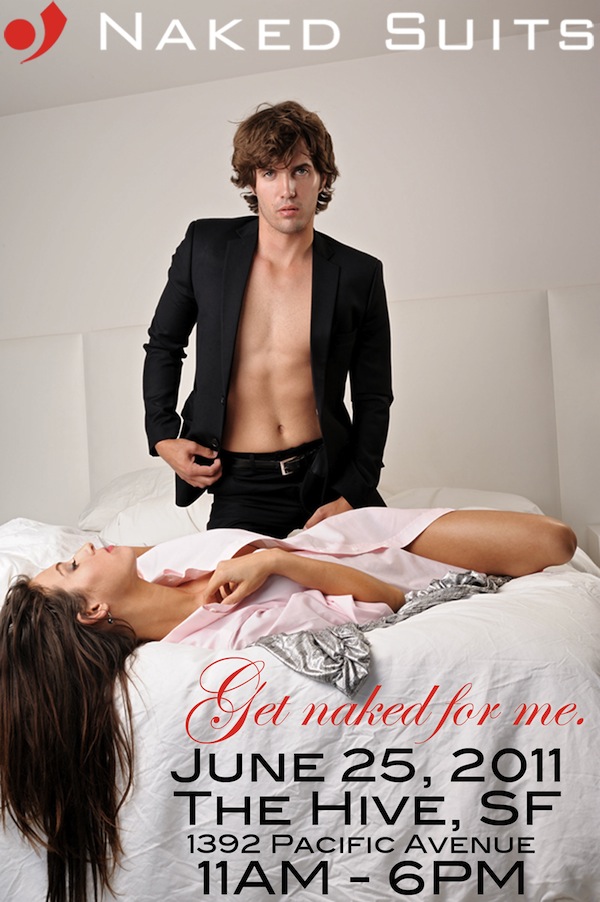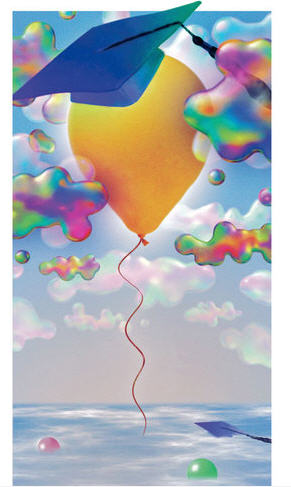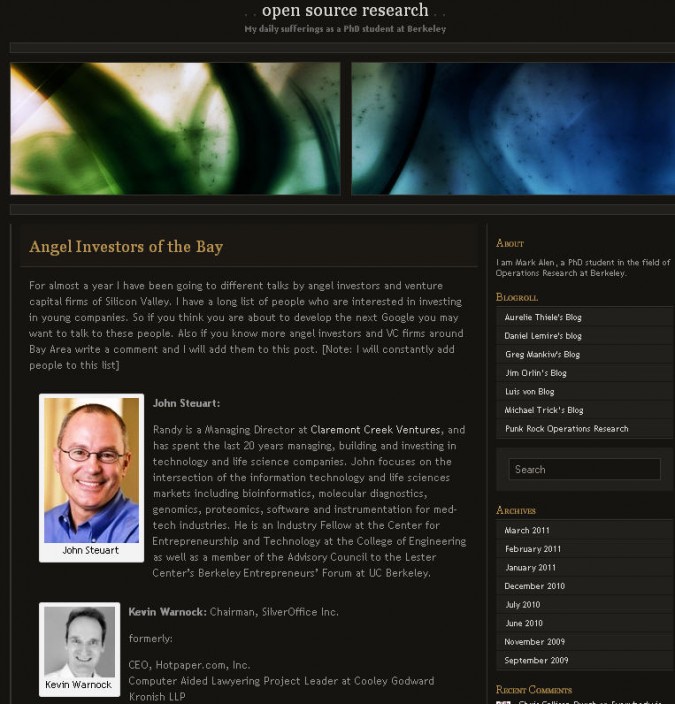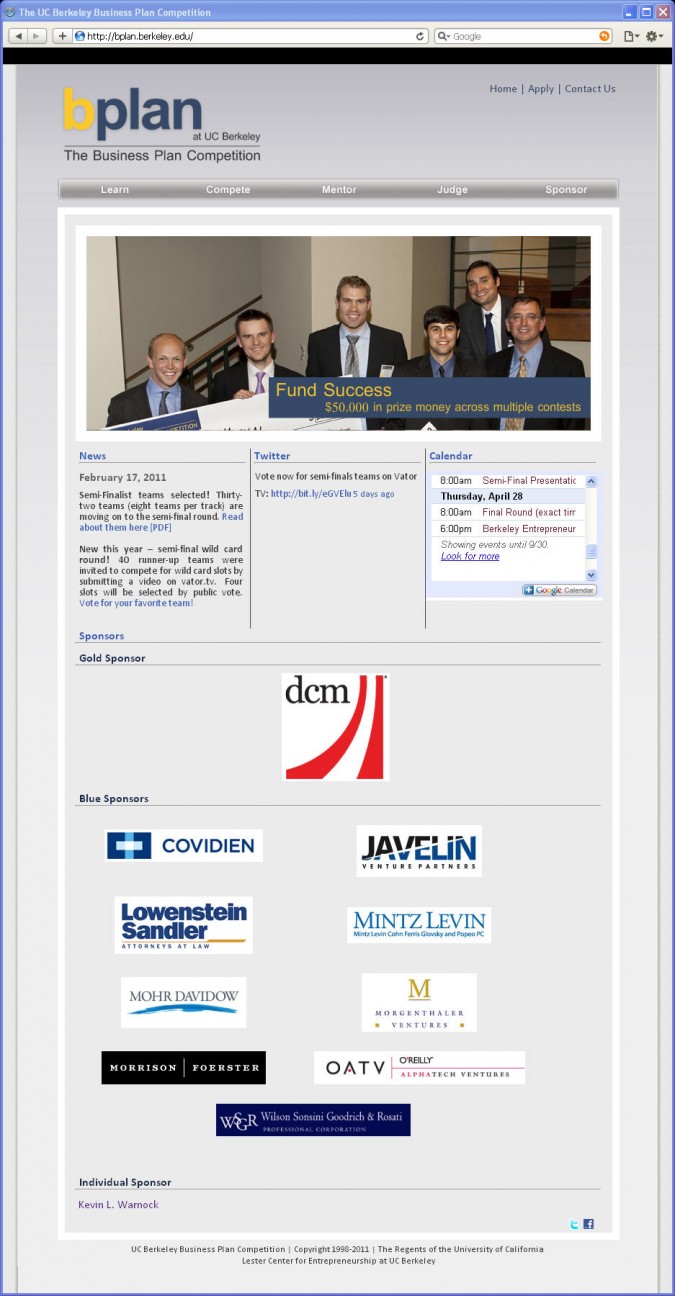Archive for the ‘uc berkeley’ tag
Naked Suits unveiling
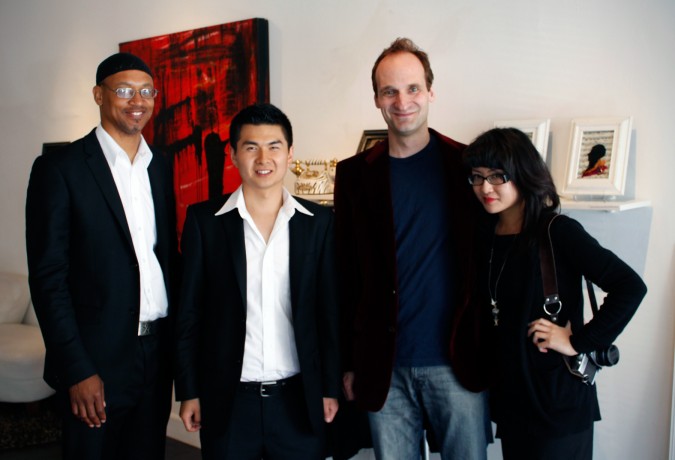
Naked Suits unveiling party June 25, 2011 - Adisa Banjoko, Ming Chang, (guest) Kevin Warnock, Judy Hoang.
On April 27, 2011 I was a judge for the Made for China Entrepreneurial Pitch Competition and Startup Fair at University of California at Berkeley.
This was a fun evening, and I made some new friends, including Ming Chang, CEO of Naked Suits.
Liu Nan had earlier arranged for me to be a judge. I met Nan at the Berkeley Entrepreneurs Forum about six months ago, and we stayed in touch.
I love judging business plan competitions.
The winner of the Made for China event is a fascinating company with the provocative name Naked Suits. Here’s a video of the team receiving their first place prize at the actual competition. They win at 5 minute marker in the video. (You can see me in the far lower right at the 5:45 marker, taking a picture with my iPhone.)
Naked Suits is a clever name.
The Naked Suits idea is that their suits are so breathable, lightweight and durable that you feel as if you’re not wearing anything at all.
While their website doesn’t say so, I understand they are using fabric that is made with nanotechnology so that it repels water and most stain causing substances.
At the unveiling, Chang set up a testing station with fabric swatches and bottles of Two Buck Chuck, the famous red wine sold by Germany’s Trader Joe’s grocery store.
I personally poured an entire glass of red wine over a Naked fabric swatch and the fabric did not get stained. The wine rolled off and the fabric remained dry once I dusted the droplet balls of wine off the fabric. None of the wine balls absorbed into the fabric. I was impressed, and that’s why I’m writing this post.
I don’t wear a suit more than about twice a year. I will put on a suit for a wedding or funeral, but I never wear a suit for work or for a date. I’m much more into sports jackets and jeans for all but the most formal occasions. So I’m not likely to buy a Naked Suit, at least until they come out with a line of sports jackets.
The suits are nice.
They are handmade in Shanghai, China without fusing, a kind of heat activated glue used on many suits.
There is red piping along the inside lining that just pops visually. It’s very eye catching, and when someone catches a glimpse of the inside of a jacket, this red bead should signal that this is a costly and luxurious product. I’ve never seen such an eye catching detail on the inside of a men’s suit jacket before, and I have looked at a lot of suits over the years. I used to wear a suit five days a week when I worked at Cooley as a programmer.
Naked Suits are a bargain at USD $695. Handmade suits usually cost a lot more. I wish Naked Suits the best of success with their exciting venture. In all my years of judging business plan competitions, I have never seen a team attempt to enter the hotly competative fashion industry. Chang and his team show a flair for the dramatic, so I like their chances. Check out the flyer they put together for their Naked Suits unveiling. This looks like it could have been produced by an established fashion brand. I’m a photographer and I like it.
The picture at the top of this post shows me with three members of the Naked Suits team.
Is college is too easy?
The opinion piece published May 14, 2011 in The New York Times newspaper entitled Your So-Called Education makes a good case that university and college students are being cheated by their schools.
I have several friends that graduate this month from University of California, Berkeley. I hope they see this blog post and can comment publicly or privately whether they agree with the authors.
I certainly feel that the classes at University of California at Los Angeles, where I went, were too easy. The only classes I recall that really challenged me were Astrophysics and Computer Programming. The Astrophysics class was an AP level course, and I really had to work hard. But I remember a lot from that class today. The Computer Programming class was not an AP level class, but it was also really hard work. That class was the single most important class of my life, as it laid the groundwork for me to become a programmer.
All the other classes were forgettable and not challenging.
I’m nearly certain I learned to write in high school, not at university. The classes at Laboratory School, where I went to high school in Chicago, were harder than most of the classes I took at UCLA.
When I was at Brooks Institute, after UCLA, the classes were a joke. I could and usually did pass them with only one day a week of work. I regret I didn’t instead attend Art Center, in Passadena, CA, which reportedly required that an assignment be turned in 5 days a week. This would have been painful at the time, but beneficial to me in the long run.
If you are thinking about enrolling at Brooks, save your money. It was a full fledged economic scam. Yes, I learned to take pretty good pictures, but that was because of my talent for it that I developed after graduation. They could have compressed their ‘4 year program’ into six months of actual hard work and saved my parents a fortune. A Brooks Institute degree used to cost about what a Stanford University degree used to cost. I should have gone to Stanford. I’m certain I could have kept up with and done the work, given what I know of my Stanford graduate friends. In fact, I have a strong and powerful suspicion that even most of the classes at Stanford aren’t particularly challenging.
Comments?
I’m an angel, apparently…
I do Google my name on occasion, like most people. Today I was shocked to find myself listed as an angel investor on the blog Mark Alen, a PhD student in the field of Operations Research at University of California at Berkeley.
I have made 3 angel investments, but I knew the founders as legitimate close friends before I invested. I’ve never held myself out to the public as an angel investor, but somehow Mark has decided I’m an angel investor.
This is flattering, so Thank You Mark.
An .edu inbound link for this blog, but I’m not Overstock.com!
I was a contestant in the first UC Berkeley Business Plan Competition, which happened in 1999. My company didn’t win anything, but it was still a remarkable experience that changed my life. Because I am so grateful, I have sponsored the competition yearly for the dozen years since. Usually the competition just lists the sponsors, but doesn’t link to them. This year all the sponsors got links! And, to make it even better, all the sponsors are listed on the front page of the bplan.berkeley.edu website. I’m getting daily traffic to this blog from that link… not enough to get me in hot water with Google like what recently happened to Overstock.
I’m happy to be recognized, and I’m happy to help the competition help others move their ideas forward. This year over 200 teams applied, a record. I encourage you to attend the public awards ceremony at 6pm on April 28, 2011 at the Haas School of Business in the Anderson Auditorium.
I’m a judge again this year for the University of California at Berkeley Business Plan Competition
I received word this week that I’ve been invited back to be a semi-final round judge for the Business Plan Competition at the University of California at Berkeley.
I can’t remember what year I started being a judge for this competition, but I strongly suspect it was 2005, plus or minus a year or two.
Judging is generally a day long affair in the Faculty Club at Berkeley. I consider it one of the most exciting days of the year. I get to meet 6 to 8 startups, and I get to see them under the pressure of one of their most important presentations they’ve likely given. It’s a really fascinating process, and I am thankful to be included by the student organizers.
I am generally the only judge that’s a practicing tech entrepreneur. The large majority of the other judges are venture capitalists. A few of of the judges are startup lawyers. I’ve made friends with a lot of VCs over the years as a result of the business plan competition. They’re not scary to me anymore.
This year I am judging teams competing in the Products and Services track. I particularly enjoy judging tracks that are not Internet tracks, because I learn more. Two years ago I judged the medical device teams, and had the priviledge to meet the AutoTB team that’s seeking to make a low cost automated digital microscope that can diagnose teberculosis in minutes. I’ve exchanged many emails over the last two years with Kelly Karns, answering her questions, and we’ve become friends. I would likely have never met her if not for the business plan competition. AutoTB won the competition in 2009. Here’s a nice article about AutoTB on CNN.com.
I read the business plans word for word before the judging day, and I take it very seriously. I competed in this same competition in 1999 and I credit it with my later success in selling the venture that competed. I have first hand knowledge of the stakes for the competitors, and I put forth a lot of effort to identify the best plans.
I love helping students, and I think I benefit from helping as much as the students benefit from my help.
